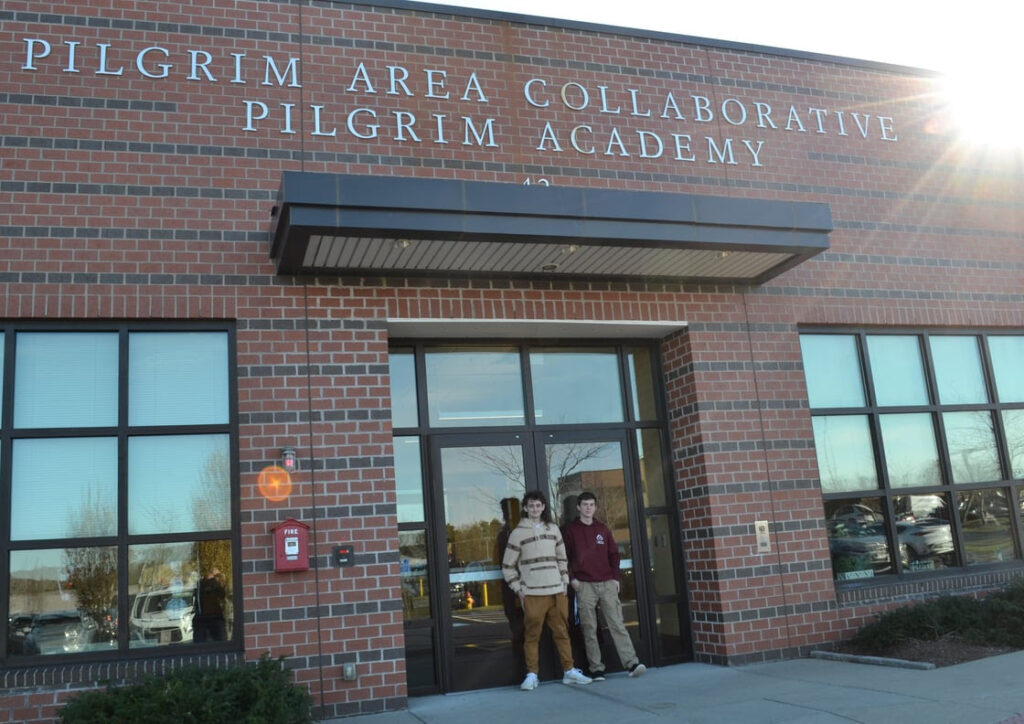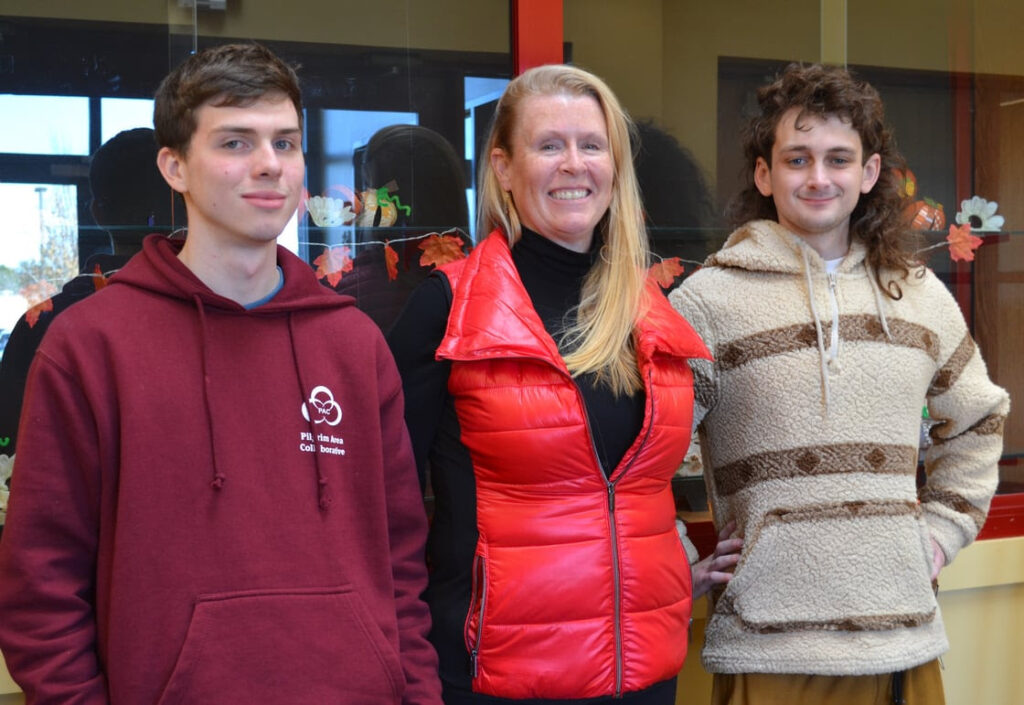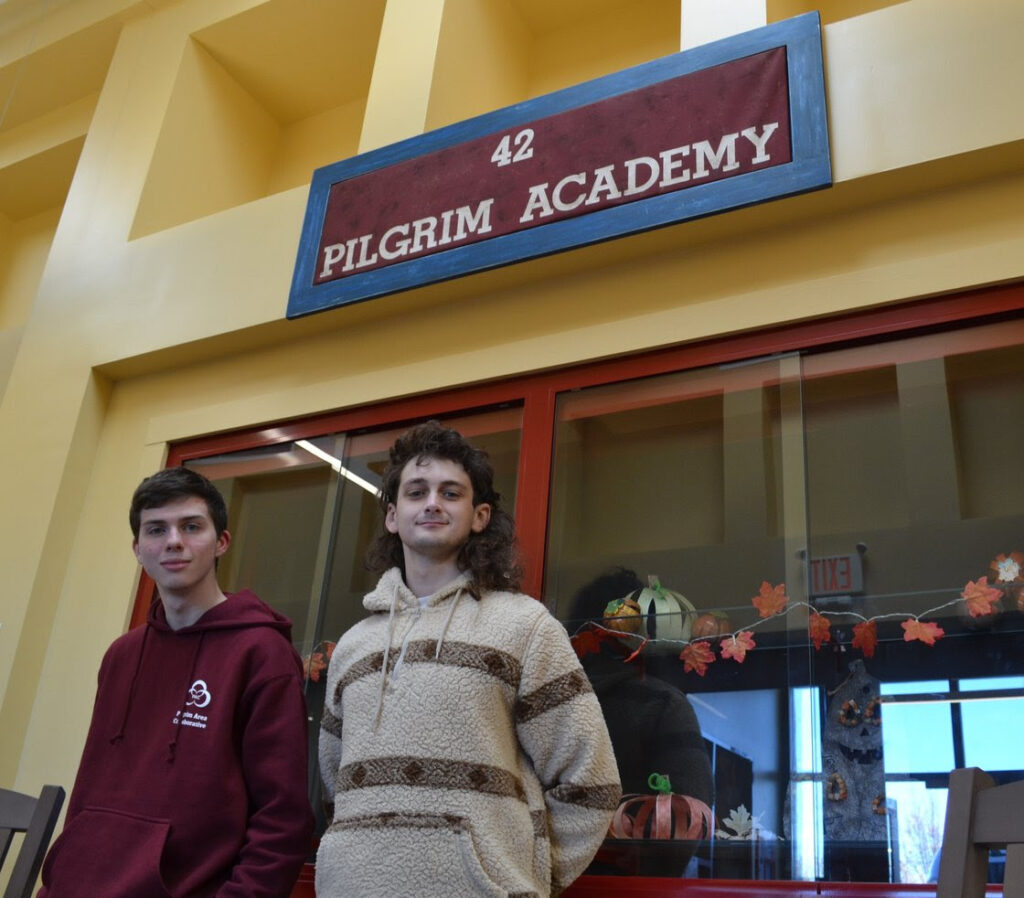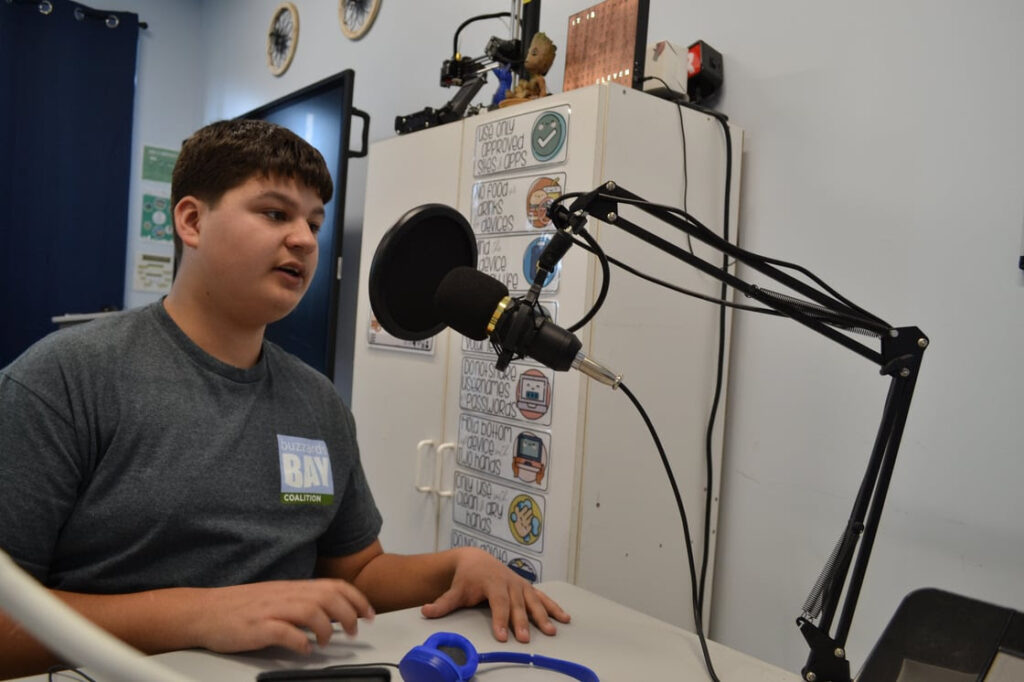
Elijah Whyte and Daniel McMahon were both students at the Pilgrim Academy, a Plymouth school operated by the Pilgrim Area Collaborative. Although both struggled with diagnoses of Autism Spectrum Disorder (ASD), they excelled and went on to earn diplomas. Now they’re both working at the Pilgrim Academy as Educational Support Professionals (ESPs).
They can really relate to the kids. After all, they were them, once upon a time.
As students initially diagnosed with Asperger’s, Elijah Whyte and Daniel McMahon did not always feel comfortable in conventional public school classrooms and hallways.
After struggling to thrive in their home school districts, Whyte and McMahon transferred to the Pilgrim Academy, a school operated by the Pilgrim Area Collaborative, where they excelled and earned their diplomas.
Today, they walk the halls of their alma mater as educators, not just former students. Now, every day, they work with students like Zachary Joseph Boyer, 16, of Whitman.
Zach, who also has a diagnosis of autism spectrum disorder (ASD), has grown to appreciate the empathy exhibited by Pilgrim Academy staffers like Whyte and McMahon.
Whyte and McMahon, both Education Support Professionals (ESPs), were uniquely qualified for their new roles at the school. At the collaborative, their autism diagnoses became assets. The two young staff members can often more easily connect with their current students, many of whom are working to overcome the same, shared obstacles.
“I don’t even consider my autism as a disability,” said Zach, a Pilgrim Academy sophomore. “My brain is just working in Windows, and everybody else is on MacOS. We all take in the same information; I just process it differently.”
Whyte and McMahon have minds that work on similar cerebral operating systems as Zach. They can relate to the potential sensory overload that can be triggered by a frenetic school classroom or hallway. They can appreciate the simple comforts — like a few moments of silence, or a quick walk.
The pair of educators recently told their stories as part of a series highlighted by the Massachusetts Organization of Educational Collaboratives’ (MOEC) celebration of special education’s 50th anniversary.
“The positive outcomes at Pilgrim Area Collaborative reflect the growing understanding and commitment to supporting students with disabilities, a progress that has been made over the past 50 years under the Individuals with Disabilities Education Act (IDEA),” said MOEC Executive Director Joanne Haley-Sullivan. “This progress reflects the vital work of collaboratives across the state in providing innovative and effective educational services to meet the diverse needs of students.”
Back Then
“Back then, in school, I often felt like my head started filling up,” Whyte recalled from his early educational experiences. “There were so many students, moving fast in the crowded halls. I’d get very sensitive — too sensitive. The hallways were always crammed with people; there was a constant flow. I’d get uncomfortable in my clothing. It was just too much to handle. Eventually, I just stopped going to school.”
Besides autism, Whyte, a Plympton native who is now 19 years old, also struggles with attention-deficit/hyperactivity disorder (ADHD). He had stopped going to school before his family discovered the Pilgrim Academy (the Pilgrim Area Collaborative’s small, structured, therapeutic school for students in grades 5-12 experiencing significant social, emotional and/or behavioral difficulties in Plymouth).
“Once I got here, I kept coming,” Whyte said.
The smaller class sizes helped to relieve the onsets of academic discomfort. The close attention he received from faculty and staff helped him absorb lessons and learn on-pace with his classmates. Whyte earned his high school diploma in 2023. Now he’s helping young students strive for the same success.
McMahon hails from Kingston. He’s now 25 years old and graduated from the Pilgrim Area Collaborative in 2017. He went on to higher education, earning a bachelor’s degree in philosophy from Wheaton College.
Besides Asperger’s, McMahon also struggles with ADHD, as well as bipolar disorder.
“I’d find myself in the middle of a lesson on long division, unable to focus for an extended period of time,” McMahon recalled. “The other kids were getting it, but I wasn’t.”
Back in 2010, he arrived at the Pilgrim Academy.
Full Circle
“Pilgrim Area Collaborative has embraced inclusive practices that promote the academic and social success of all students, showcasing the ongoing evolution of specialized education,” said MOEC Executive Director Haley-Sullivan. “This shift highlights the increasing recognition of the importance of tailored educational opportunities, ensuring that students with disabilities have access to quality learning environments that foster their full potential. Elijah Whyte and Daniel McMahon exemplify this.”
Whyte and McMahon recently sat for an interview, accompanied by Pilgrim Area Collaborative Executive Director Dr. Dympna M. Thomas, to discuss how their paths led them to the point they’re at now.
Executive Director Dr. Thomas says that the small class sizes and level of support they are able to provide make it feel like they’re all a part of a family.
Around 40 students are enrolled in the Pilgrim Academy’s ASD program, run by about 25 staff members. The collaborative as a whole has about 120 total students with 100 staff, not including home services staff.
That family feeling made a deep impression on McMahon.
“To have a community that is like me — that meant a lot,” McMahon said. “To be around other neurodivergent people, that sense of community, it mattered.”
The Pilgrim Academy’s self-stated goal of placement is to assist students in re establishing and maintaining typical adolescent responsibilities such as consistent school attendance, appropriate emotional regulation, effective interpersonal skills and consistent completion of schoolwork.
The school has programs designed for students with a primary diagnosis of high functioning autism spectrum disorder, non-verbal learning disability, and/or executive functioning difficulties. It focuses on providing students with an opportunity for psychological, academic, and personal growth.
After graduating, both Whyte and McMahon returned to the school to work as full time education support professionals (ESPs).
“Watching these two with kids is just amazing because they relate so much with the students,” Executive Director Dr. Thomas said.
“It is so easy to see yourself in these kids,” McMahon said.
“You two are like the cool older kids,” Dr. Thomas said to Whyte and McMahon. “The kids connect with you in ways they could never connect with others.”
Their Return
“I’ve learned to encourage their little quirky behaviors,” McMahon said. “That’s what makes me special. That’s what makes us special.”
Zach, the Pilgrim Academy sophomore was joined by fellow student, Jack Ruben Anzora, 14, of Plymouth. The pair developed a friendship playing Fortnite online and have bonded in the classroom. They both said they appreciate staffers like McMahon and Whyte, who seem to understand their daily struggles.
Whyte said he sees himself in the pupils he works with every day.
“I had a lot of the same struggles,” Whyte said. “I had freakouts regularly. I would squeeze my pencil until it broke. Or I’d scratch at my neck; I’d scratch and scratch. I couldn’t help it. But then things started getting better.”
Zach had similar struggles with anger and acting out. As a younger Pilgrim Academy student, he would often bang his head against the wall repeatedly, risking injury but unable to stop. He eventually learned therapeutic techniques that helped him rationalize and eventually end the destructive behavior.
“Now I know that banging my head against the wall could lead to brain damage,” Zach said, standing to stretch and work his legs. “Now I’ve been here almost five years. I don’t bang my head against walls anymore.”
McMahon is proud he can now help those whom he calls his “fellow neurodivergent.”
“I just let them know that they are not alone in their struggle,” he said.
For Dr. Thomas, the addition of two former students to the staff personifies the special education success story.
“There’s nothing more satisfying than watching your students grow and return,” Dr. Thomas said. “We’ve come full circle. I’m so proud of them both.”
In 2025, the Massachusetts Organization of Educational Collaboratives (MOEC) is celebrating the 50th anniversary of special education with a series of feature stories that will help to tell the untold stories of collaboratives to help educate the public about what collaboratives do and how they have evolved to serve the needs of our most vulnerable students over the past five decades.
In 1975, Congress enacted the Education for All Handicapped Children Act (EHA) to ensure that all children with disabilities have access to a free and appropriate public education. Congress changed the name of the law to the Individuals with Disabilities Education Act (IDEA), in a 1990 reauthorization — and IDEA was again reauthorized in 2004.
MOEC is the professional organization representing the Commonwealth’s educational collaboratives. Massachusetts Collaboratives are a statewide network of educational service agencies that work together with school districts and schools to implement direct educational services and programs to students and adults, develop programs and services to enhance school districts’ operating efficiency, and provide high-quality professional development and technical assistance.

Elijah Whyte and Daniel McMahon were both students at the Pilgrim Academy, a Plymouth school operated by the Pilgrim Area Collaborative. Although both struggled with diagnoses of Autism Spectrum Disorder (ASD), they excelled and went on to earn diplomas. Now they’re both working at the Pilgrim Academy as Educational Support Professionals (ESPs). They posed for a photo with Pilgrim Area Collaborative Executive Director Dympna M. Thomas.

Elijah Whyte and Daniel McMahon were both students at the Pilgrim Academy, a Plymouth school operated by the Pilgrim Area Collaborative. Although both struggled with diagnoses of Autism Spectrum Disorder (ASD), they excelled and went on to earn diplomas. Now they’re both working at the Pilgrim Academy as Educational Support Professionals (ESPs).

Pilgrim Academy sophomore Zachary Joseph Boyer, 16, of Whitman, who has a diagnosis of Autism Spectrum Disorder (ASD), loves to draw and paint. He has a penchant for superheroes, and he has learned to use art to express himself.

Pilgrim Academy freshman Jack Ruben Anzora, 14, of Plymouth, recently helped the school launch its first podcast.